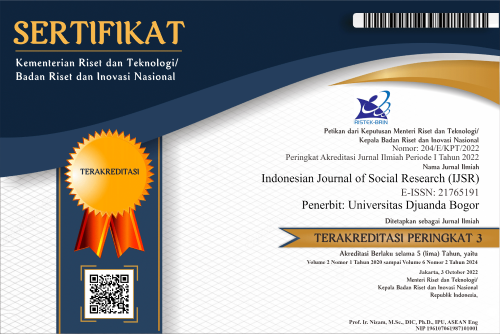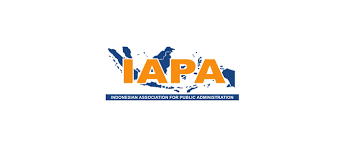The Social Capital Ability to Communal Cattle Survive in Rural of Special Region of Yogyakarta, Indonesia
Abstract
Globalization has led to a capital transformation that alters culture, values, and human attitudes, making people more individualistic. Social capital acts as a social glue by fostering trust, social norms, cooperation, and a sense of community. This paper will discuss how social capital can be a driving factor for the survival of communal cattle. We conducted this research in Kulwaru Village, Special Region of Yogyakarta. This study used a qualitative approach with data collection through observation, Focus Group Discussion (FGD), in-depth interviews with key informants, and study of program-related documents. The data obtained were then analyzed using an interactive model. The results of the study show that the existence of social capital in the communal cattle in Kulwaru Village has a vital role in shaping social values in society, such as trust, norms, social relations, and cooperation which provides strong bonds in communities both in bonding, bridging, and linking. This factor has made the communal cattle survive for the last twelve years. The findings of this research will contribute to understanding and harnessing the social capital of rural communities; it is possible to support the continuation of this traditional practice and contribute to the economic and cultural well-being of the communities involved.
References
Abdullah, S. (2013). Potential and Strength of Social Capital in a Community. SOCIUS J Sosiol, 12(1), 15-21.
Aditya, Z. F. (2018). Penerapan Modal Sosial dalam Praktek Peradilan yang Berbasis Kepekaan Sosial. Jurnal Ilmiah Hukum LEGALITY, 25(2), 200. https://doi.org/10.22219/jihl.v25i2.6002.
Berraies, S., Lajili, R., & Chtioui, R. (2020). Social capital, employees’ well-being and knowledge sharing: Does enterprise social networks use matter? Case of Tunisian knowledge-intensive firms. Journal of Intellectual Capital, 21(6), 1153–1183. https://doi.org/10.1108/JIC-01-2020-0012.
Bjørnskov, C., & Sønderskov, K. M. (2012). Is Social Capital a Good Concept? Social
Cresswell, J. W. (2018). Research Design: Pendekatan Metode Kualitatif, Kuantitatif, dan Campuran (Third). Pustaka Pelajar.
Dodd, M. D. (2012). A Social Capital Model of Public Relations : Development and Validation of a Social Capital Measure. University of Miami. 991031447247902976. [Doctoral dissertation, University of Miami]. Research Portal.
Field, J. (2018). Social Capital. In Social Capital (Fifth). Discourse and Creation. https://doi.org/10.4324/9780203634080
Hadi, S. (2016). Metodologi Riset. Pustaka Pelajar.
Hanafi, H. (2016). The Role of Beef Cattle Communal System Cages Integrated with Agricultural Waste in Supporting Food Sovereignty in Yogyakarta. Agros Journal, 18(2), 126–133.
Merlinda, S., Nanda, H. I., Irafahmi, D. T., Agil, A., Rakhmad, N., & Ismail, A. G. (2023). Strengthening Social Capital Communities in Livestock Management (Case Study: Belung Village). ICEBE, 1, 231–241. https://doi.org/10.2991/978-2-38476-064-0
Mialiawati, I. (2020). The Effect of Globalization on Culture, Information Technology, and Education. Proceeding ICTESS (International Conference on Technology, Education and Social Sciences).
Procentese, F., Gatti, F., & Falanga, A. (2019). Sense of responsible togetherness, sense of community and participation: Looking at the relationships in a university campus. Human Affairs, 29(2), 247–263. https://doi.org/10.1515/humaff-2019-0020
Reutov, E., Reutova, M., & Shavyrina, I. (2018). Reciprocity Principle Within Mutual Aid Relations. SHS Web of Conferences, 50, 01010. https://doi.org/10.1051/shsconf/20185001010
Sanjaya, S. (2015). Modal sosial sistem bagi hasil dalam beternak sapi pada masyarakat desa Purwosari Atas, kecamatan Dolok Batu Nanggar kabupaten Simalungun. Perspektif Sosiologi, 3(1), 156643
Santosa, F. J., Setyowati, R., & Wibowo, A. (2020). Social Capital in Communal Livestock Management. Universitas Sebelas Maret.
Santosa, F. J., Setyowati, R., & Wibowo, A. (2021). Bisakah Pembangunan Pedesaan Berhasil? Studi Kasus Kandang Komunal di Desa Kulwaru, Yogyakarta. In Prosiding Seminar Nasional Perbatasan dan Desa (pp. 109-117).
Saputra, A., Sutarmadi, A., Bahri, S., Uwes, S., & Management, I. E. (2022). How Implementing of Social Capital to Improving Islamic Education Quality : The Social. Indonesian Journal of Social Research, 4(3), 139–150. https://doi.org/10.30997/ijsr.v4i3.206
Sugiyono, P. (2019). Metode Penelitian Kuantitatif Kualitatif dan R&D. Alfabeta.
Susanto, T., Sarwoprasodjo, S., & Kinseng, R. A. (2022). Social Capital in the Development of Tolerance Behavior between Religious Communities in the Peaceful Village of Gemblegan, Klaten Indonesia. International Journal of Multicultural and Multireligious Understanding, 9(8), 134–139.
Voisey, H., & Riordan, T. O. (2017). Globalization and Localization. In O’Riordan, T. (2010). Globalism, Localism and Identity. Routledge. https://doi.org/10.4324/9781849776202
Wibowo, A. (2016). Partisipasi Yang Humanis: Sebuah Refleksi Kearifan Lokal Masyarakat Samin di Bawah Terpaan Globalisasi. UNS Press.
Yin, R. K. (2012). Case study methods. APA Handbook of Research Methods in Psychology, Vol 2: Research Designs: Quantitative, Qualitative, Neuropsychological, and Biological., 141–155. https://doi.org/10.1037/13620-009
Yudiaatmaja, F. (2013). Kepemimpinan: Konsep; Teori dan Karakternya. Media Komunikasi, 12(2), 29–38.
Zhou, W., He, J., Liu, S., & Xu, D. (2023). How Does Trust Influence Farmers’ Low-Carbon Agricultural Technology Adoption? Evidence from Rural Southwest, China. Land, 12(2). https://doi.org/10.3390/land12020466
Zuroida, R., & Azizah, R. (2018). Cages sanitation and health complaints among dairy farmers in Murukan Village, Jombang. Jurnal Kesehatan Lingkungan, 10(4), 434-440. https://doi.org/10.20473/jkl.v10i4.2018.434-440
Copyright (c) 2023 Indonesian Journal of Social Research (IJSR)

This work is licensed under a Creative Commons Attribution-ShareAlike 4.0 International License.
The Authors submitting a manuscript do so on the understanding that if accepted for publication, copyright publishing of the article shall be assigned/transferred to Indonesian Journal of Social Research (IJSR) Universitas Djuanda as Publisher of the journal. Upon acceptance of an article, authors will be asked to complete a 'Copyright Transfer Agreement'. An e-mail will be sent to the corresponding author confirming receipt of the manuscript together with a 'Copyright Transfer Agreement' form by online version of this agreement.
Indonesian Journal of Social Research (IJSR) Universitas Djuanda, the Editors and the Editorial Board make every effort to ensure that no wrong or misleading data, opinions or statements be published in the journal. In any way, the contents of the articles and advertisements published in the Indonesian Journal of Social Research (IJSR) Universitas Djuanda are sole and exclusive responsibility of their respective authors and advertisers.
Remember, even though we ask for a transfer of copyright, our journal authors retain (or are granted back) significant scholarly rights as mention before.
The Copyright Transfer Agreement (CTA) Form can be downloaded here: Copyright Transfer Agreement-IJSR 2020
The copyright form should be signed electronically and send to the Editorial Office e-mail below:
Dr. Rasmitadila, M.Pd (Editor-in-Chief)
Universitas Djuanda
Jl. Tol Jagorawi No.1, Ciawi, Kec. Ciawi, Bogor, Jawa Barat 16720
Website: http://journal.unida.ac.id/index.php/IJSR/index
Email: ijsr@unida.ac.id





4.png)



